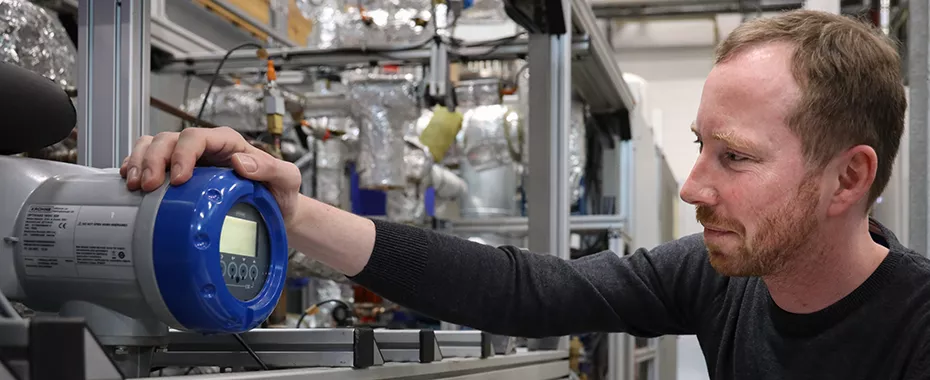GeoThermics / GeoEnergy M. Sc.
The Friedrich-Alexander-Universität Erlangen-Nürnberg and the Technical University of Munich offer the Master's program GeoThermics / GeoEnergy in cooperation. The aim is to train highly qualified specialists in the field of geothermal energy for the growth market of renewable energies. The degree programme conveys relevant teaching content from the exploration and development of the resource to the energetic use and storage of thermal energy.
The degree programme teaches modern exploration methods for locating resources, e.g. seismic interpretation, tectonics, reservoir geology and modelling. Students also acquire the necessary knowledge of geomechanics, rock physics, hydrochemistry, flow and heat transport modelling, production, energy and drilling technology in order to tap and utilise resources in a sustainable and resource-conserving manner. The economic, ecological and legal framework conditions are additionally addressed by modules in energy economics, business administration in the context of energy, environmental and procurement law and citizen participation.
Further special features of the degree programme are:
- Comprehensive topical range of the degree programme – from exploring and tapping geothermal and other geoenergy resources to their use and storage
- Promotion of innovative, interdisciplinary approaches and practices in exploring and using geoenergy resources
- Combined teaching and research expertise relevant for geoenergy resources
- Content and methods can be directly transferred to many other areas requiring an understanding of the deeper subsurface (e.g. gas, fluid and heat storage)
What you'll learn for your future?
The World is dependent on the long-term availability of affordable, base-load-capable energy. Increasing demand with energy sources such as crude oil and natural gas, the complexity of "unconventional" energy sources, but also the high demand for renewable energy such as geothermal energy due to the desired energy transition are creating new challenges. As a result, the need for interdisciplinary geoscientists who can oversee and apply interdisciplinary relationships and decision-making processes in the exploration, economic development and sustainable use of geoenergy resources is increasing.
Fields of activity of geothermal energy/geoenergy include:
- Energy and resource management
- Exploration, development and use of conventional and unconventional energy sources
- Exploration of underground storage, geotechnical engineering and mining
- Engineering geology offices and consulting firms
- Insurance companies and expert offices
- Environmental authorities and associations
- Educational and research institutions
Type of Study: Full Time
Standard Duration of Studies: 4 Semester
Credits: 120 ECTS
Main Locations: Erlangen
Admission Category: Aptitude Assessment for Master
Start of Degree Program: Winter Semester (October)
Application Period: Winter semester 01.05. - 15.07.
Required Language Proficiency: German
Tuition Fees: for Students from Non-EU Countries
The program takes place mainly in Erlangen (GeoZentrum Nordbayern). During the first semester all courses are held in Erlangen. In the second and third semesters, you will attend courses in Munich (campuses city center and Garching) up to two days per week. Travel expenses will be covered by the program provider. In the fourth semester, you have the option of writing and supervising your master's thesis in Erlangen or Munich.
The first semester introduces geoenergy resources. In addition, the topics of borehole geology, process machine and apparatus technology, drilling technology and borehole geophysics, approval and energy and raw material law are taught. Block courses take place during the lecture-free period. In the second semester, knowledge of geophysical exploration and the compositional, petrophysical, geomechanical and geophysical characterization and evaluation of reservoir rocks is deepened. In addition, there will be an introduction to business administration, energy economics and environmental law. During the lecture-free period, block courses and the key qualification module Citizen Participation are offered.
In the third semester, knowledge of research modules on seismic reservoir interpretation, reservoir geology, reservoir reinterology and fluids, reservoir hydraulics and energetic systems, the contents of which serve the immediate preparation and professional orientation for the master's thesis, are deepened. During the lecture-free period, the key qualification module industrial internship, project work or field exercises take place. The fourth semester serves to prepare the master's thesis and defend it in the master's colloquium.
The study programme not only teaches modern exploration methods for finding resources, such as seismic interpretation, tectonics, reservoir geology and modelling, but also the knowledge required for sustainable and resource-conserving development and use in geomechanics, rock physics, hydrochemistry, flow and heat transport modelling, extraction, energy and drilling technology. The economic-ecological and legal framework conditions are demonstrated through courses on energy economics, business administration in the context of energy, environmental and public procurement law as well as citizen participation.
In addition, students acquire qualifications such as: innovative, interdisciplinary thinking and action in the exploration and use of geoenergy resources, a holistic view of geothermal and other geoenergy resources, transfer of (engineering) geological expertise to other issues relating to the understanding of the deep geological subsurface (e.g. gas, fluid and heat storage).
